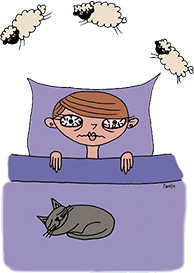What are some ways I can get a better sleep when doing late night shift work?
10 Answers
Last Updated: 08/06/2019 at 5:51pm


Moderated by
Lisa Groesz, PhD
Psychologist
With evidenced based therapies, we find the root of the problem together to implement solutions. We all face crises, transitions, or disorders at some time.
Top Rated Answers
Try and have a good water intake and refraine from eating junk food before falling asleep. Exercisisng alos helps when trying to rest.
Putting on some music is very helpful, especially if it is relaxing, with a slow tempo and soft acoustic instruments. I would reccommend Bon Iver, Iron & Wine, Nick Drake, or just anything that you find soothing.
Anonymous
June 16th, 2015 3:30pm
Power naps! If your late shift isn't routine and is erratic, then try to master the art of rest. Exercise to really be fatigued when it's time to rest can also be helpful.
Power nap (around 23 minutes) would help you regenerate throughout the day as well as balancing the sleep deficit.
Anonymous
June 23rd, 2015 9:18pm
Drink some white tea, it helps you sleep better and relax! Also reading at least 30 minutes will help you in relaxing and preparing yourself to sleep.
Washing face and feet, drinking a glass of warm milk and most of all switching off mobile phone and laptops can solve your sleeping problems. Also try to find a quite and dark room for better sleep.
Our physical body is built in such a way that it accepts that we work during the day and sleep at night. A night shift work alters the whole natural function of the body that is why its difficult to sleep. You can try to induce sleep by trying different methods like music, drinking warm milk, watching a movie or reading a book. However note that sleep cannot be forced, it will only come on its own. All you can do is to help your body to relax and adjust to the new.
Listening to rain sounds, ebooks or a conversation in a language that you can't understand. :)
Working night shifts can be difficult for many people since it throws off the circadian rhythm (internal body clock), so you're not alone. Try to still get seven to nine hours of sleep when you come home from work. Napping for about 90 minutes before you go to work may also be helpful. When your shift is over, try to take another short 15-minute nap before driving home to help re-energize your body and mind, which would make the commute safer. Remember to be patient when adjusting to your new sleep strategy, it is a new experience for your body. If you are having trouble adapting to the new bedtime hours after a month or two, talk with your doctor about other ways to get the sleep you need, no matter what your schedule is. They can prescribe medication that would make it easier for you to fall asleep.
When you're not getting enough sleep in the night, one important thing to think about is how it impacts your quality of sleep. For good sleep, your room should be as dark as possible - ideally pitch black - and it should be very quiet. You can use curtains or, even better, blinds to achieve darkness and unplug any device that has a light on it, even if it is just a small one. If your neighbourhood is loud during the day, maybe you can consider using earplugs. Another important thing is to not eat a big meal before you go to sleep, because that keeps your body from getting really relaxed (because it has to digest). Ideally do not eat in the last 4 hours before you go to sleep. A going-to-bed routine could help you fall asleep faster, too! Hope that helped.
Related Questions: What are some ways I can get a better sleep when doing late night shift work?
At what point does sleep deprivation become a problem?How much sleep should I get daily? Why do I wake up sweating?How do I stop over thinking at night?How can I put down my phone and go to sleep?What does it mean when your dreams feel so real?Why do I wake up every hour, on the hour?What could it mean if I am sleeping too much?Why can't I sleep at night?How much screen time is too much?